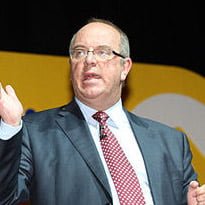Nicholson to retire
- 21 May 2013

Sir David Nicholson will retire as chief executive of NHS England in March 2014. He has worked in the NHS for 35 years in more than 14 organisations.
He was NHS chief executive for almost seven years and agreed to become chief executive of the NHS Commissioning Board in October 2011, leading it through the transition to NHS England.
Sir David has come under increasing pressure to retire since Robert Francis QC’s report into failings at the Mid Staffordshire NHS Foundation Trust was released in February.
He was chief executive of the strategic health authority that oversaw the trust as issues were first raised about high death rates and poor care, before he moved to his Department of Health role.
Sir David had resisted calls to resign over the scandal that may have led to as many as 1,200 excess deaths and Prime Minister David Cameron repeatedly backed him. However, NHS England announced his retirement this afternoon.
In a letter to Professor Malcolm Grant, chair of NHS England, Sir David said: “I have only ever had one ambition and that is to improve the quality of care for patients.
“I still passionately believe in what NHS England intends to do. My hope is that by being clear about my intentions now will give the organisation the opportunity to attract candidates of the very highest calibre so they can appoint someone who will be able to see this essential work through to its completion.
“I continue, and will always continue, to be inspired and moved by the passion that those who work in the NHS show. I also want to recognise the contribution of staff in the NHS and their recent efforts working in such a challenging environment have been nothing short of heroic.”
Professor Grant replied that Sir David’s career within the NHS over 35 years had been exceptional.
“In particular, the establishment, set-up and launch of NHS England has been an immensely difficult task, undertaken by Sir David concurrently with leading the NHS in its former guise.
"Thanks to Sir David’s leadership we are now in as good a position as we could be to take on the challenges that lie ahead.”
Sir David famously leant his name to the ‘Nicholson challenge’ for the NHS to find £20 billion in "efficiency savings" by 2015, to bridge the gap between flat funding for the health service and growing demand.
This equates to "unprecedented" efficiency savings of around 4% a year. But Sir David warned that the alternative was a financial crisis or the kind of ‘salami-slicing’ cuts that have been made in previous contractions.
Health secretary Jeremy Hunt said that under Sir David’s leadership, the NHS had put a new focus on quality. He said that during his time as chief executive, NHS waiting times had fallen, infection rates reduced, and mixed sex accommodation was at an all-time low.
“His job has often been incredibly complex and very difficult, and yet he has always had a reputation for staying calm, and maintaining a relentless focus on what makes a difference on the NHS frontline.
“I am also grateful to him for overseeing the successful setting up of NHS England and giving us an orderly period in which to select his successor.”
Mike Farrar, chief executive of the NHS Confederation, commented: "Despite the difficulties of recent months, today’s announcement provides an opportunity to focus on Sir David’s contribution to the NHS over the past three decades.
"NHS England will now need to look forward and appoint a leader who must empower the local clinicians and managers heading up the new commissioning system so that it can deliver what is needed in the years ahead."
Sir David was also, for several years, the senior responsible officer for the National Programme for IT in the NHS, and in August 2011 came under criticism from the National Audit Office for failing to adequately fulfil the role.
However, he was also responsible for attempting to shift the NHS away from a focus on systems, introducing the idea of ‘clinical 5’ functionality that would enable trusts to engage clinicians.
Responding to today’s announcement, Chris Ham, the chief executive of the King’s Fund think-tank, said it marked "the end of an era."
"With fundamental change essential if the NHS is to meet the challenges of the future, his successor will inherit a very demanding job," he added.




